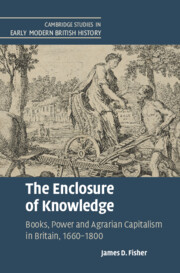Book contents
- The Enclosure of Knowledge
- Cambridge Studies in Early Modern British History
- The Enclosure of Knowledge
- Copyright page
- Dedication
- Contents
- Figures
- Tables
- Acknowledgements
- Notes
- Abbreviations
- Introduction
- Chapter 1 Rethinking Agricultural Books, Knowledge and Labour
- Chapter 2 Learning without Books
- Chapter 3 Standing on the Shoulders of Peasants
- Chapter 4 Learning without Labour
- Chapter 5 Dividing Head and Hand
- Chapter 6 Monopolising Knowledge
- Chapter 7 The Master Should Know More
- Conclusion
- Appendix
- Bibliography
- Index
Chapter 4 - Learning without Labour
Codification and Managerial Knowledge
Published online by Cambridge University Press: 07 July 2022
- The Enclosure of Knowledge
- Cambridge Studies in Early Modern British History
- The Enclosure of Knowledge
- Copyright page
- Dedication
- Contents
- Figures
- Tables
- Acknowledgements
- Notes
- Abbreviations
- Introduction
- Chapter 1 Rethinking Agricultural Books, Knowledge and Labour
- Chapter 2 Learning without Books
- Chapter 3 Standing on the Shoulders of Peasants
- Chapter 4 Learning without Labour
- Chapter 5 Dividing Head and Hand
- Chapter 6 Monopolising Knowledge
- Chapter 7 The Master Should Know More
- Conclusion
- Appendix
- Bibliography
- Index
Summary
Chapter 4 examines the codification of agricultural knowledge, the process through which practical knowledge was transformed into writing. Rather than asking whether this produced ‘useful’ knowledge to improve farming methods, it asks: for whom was such knowledge useful? It first identifies the construction of ‘agriculture’ as a literary category and an independent body of theory in the seventeenth century, departing from classical and medieval genres. The main section analyses four key modes of codification from 1669 to 1792: systematic, theoretical, experimental and observational. It argues that fundamentally all these modes of codification were shaped by the need to subordinate customary knowledge and labour and establish the supremacy of written knowledge. It further argues that the art of husbandry was codified in accordance with the cultural preferences and managerial interests of landowners, professionals and large farmers. Hence farming books provided a managerial knowledge suitable for the emerging occupational structures of agrarian capitalism.
Keywords
Information
- Type
- Chapter
- Information
- The Enclosure of KnowledgeBooks, Power and Agrarian Capitalism in Britain, 1660–1800, pp. 122 - 169Publisher: Cambridge University PressPrint publication year: 2022
